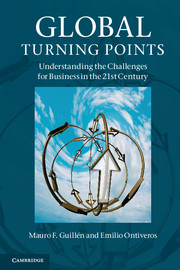Book contents
- Frontmatter
- Contents
- Illustrations
- Tables
- Preface
- 1 Welcome to the twenty-first century
- 2 A global economy out of balance
- 3 The rise of the emerging-market multinationals
- 4 The new demography
- 5 From dictatorship to democracy and failed states
- 6 A disparate world
- 7 The quest for sustainability
- 8 The global powers of the twenty-first century
- 9 Coping with uncertainty and complexity
- References
- Index
7 - The quest for sustainability
- Frontmatter
- Contents
- Illustrations
- Tables
- Preface
- 1 Welcome to the twenty-first century
- 2 A global economy out of balance
- 3 The rise of the emerging-market multinationals
- 4 The new demography
- 5 From dictatorship to democracy and failed states
- 6 A disparate world
- 7 The quest for sustainability
- 8 The global powers of the twenty-first century
- 9 Coping with uncertainty and complexity
- References
- Index
Summary
KEY GLOBAL TURNING POINTS
Top scientists predict that, without corrective action, climate change will become irreversible at some tipping point during the twenty-first century. By 2030 food prices could be twice as high as in 2011, and half of the world’s population could be affected by severe water shortages.
At a time when the most pressing priority has to do with accelerating economic growth so that unemployment recedes, one runs the risk of relegating the long term to the background. The ways in which we generate economic growth and well-being in the short term, however, are intimately linked to our ability to keep the momentum going over the long run. It is not always easy to make temporal perspectives compatible and complementary. Indeed, it is very hard to establish priorities and to distinguish between what is important and what is urgent. It is at the intersection of these treacherous cross-currents that the concept of sustainability lies.
From an economic point of view, sustainability has to do with ensuring that satisfying present needs does not come at the expense of doing so in the future. This idea concocts social and political dimensions as well because sustainability involves delicate intergenerational trade-offs. Thus, the concept of sustainability – the sustainable development of human societies – goes well beyond the concerns about energy, natural resources, and the environment supporting life on the planet to include all aspects of social, economic, and political life in so far as present actions may place limitations on future actions. Thus, pension schemes, educational programs, the banking system, or political regimes have varying degrees of sustainability built into them. Having covered some of these broader concerns in Chapters 2, 5, and 6, in this chapter we will focus on the challenges of global warming, energy, food, and water, and on the opportunities they represent for business (Matthew 2012; Waughray 2011; WWF 2010).
- Type
- Chapter
- Information
- Global Turning PointsUnderstanding the Challenges for Business in the 21st Century, pp. 105 - 120Publisher: Cambridge University PressPrint publication year: 2012



